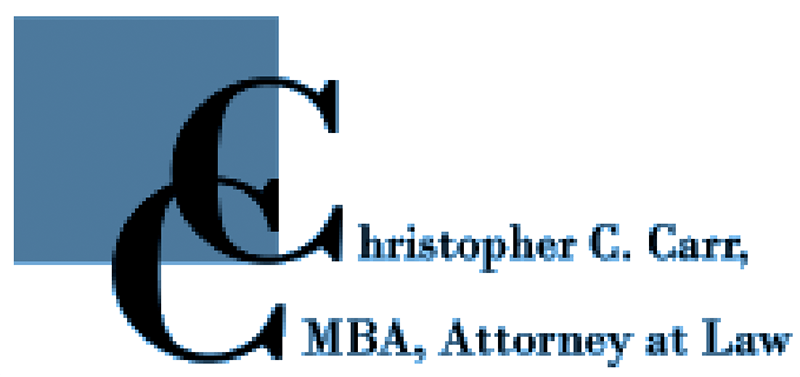Chapter 7 Vs. Chapter 13 Bankruptcy
What Are the Differences Between Chapters 7 and 13?
How to Prepare for the First Attorney Meeting.
When you contact The Law Offices of Christopher C. Carr, MBA. P.C., you can expect to meet with an attorney. Unlike some firms that push their clients' work onto paralegals or inexperienced staff members, Mr. Carr works closely with his clients throughout the bankruptcy process, learning their objectives, determining if bankruptcy is the right course, and suggesting other alternatives to either replace or supplement the bankruptcy process. For example, we have extensive expertise in preparing properly detailed loan modifications and in negotiating with lenders to get your mortgage payment reduced.
As a multi faceted practitioner, I use both my financial and bankruptcy training to offer the appropriate advice to help you meet your goals.
Get your life back on track! Contact me for a free initial consultation. Call (610) 380-7969 or email me at cccarresq@aol.com TODAY for a free consultation.
In Preparation for Meeting with Your Lawyer for the First Time:
To help us understand your situation, it is important for you to bring all of your BILLS, AND 6 months PAY STUBS (with no gaps) and a CREDIT REPORT from each of the 3 major credit bureaus which can be obtained for free to your first appointment. This includes 2 YEARS TAX RETURNS, COURT ORDERS FOR CHILD SUPPORT OR DIVORCE and copies Of Any LEGAL COMPLAINTS that you have filed or have been filed against you. If you are self-employed, it is also necessary to bring your BUSINESS'S PROFIT AND LOSS STATEMENTS for the last 12 months. If you own a home, bring any APPRAISALS done in the past year and a copy of a recent mortgage statement. In addition, it will greatly speed up the process if you:
- View the videos Basic Bankruptcy Videos at the US Bankruptcy Courts site to gain a better understanding of the process you may be going through. http://www.uscourts.gov/video/bankruptcybasics/bankruptcyBasics.html (paste in your browser)
- Complete 4 page Intake Form and bring to the meeting. This can be downloaded here.
- Gather copies of the documents listed above and bring to the meeting. Please go here for a comprehensive listing of documents we will need. Note that this list is designed to cover all situations and thus that many items will not apply to you.
- Complete the credit counseling requirements required of all new filers. See http://www.justice.gov/ust/eo/bapcpa/ccde/cc_approved.htm for a list of approved providers
Discharging Debts under Bankruptcy
affairs. This includes your income, expenses, who you owe and what you owe them.
- In a CHAPTER 7 BANKRUPTCY, you are essentially saying to the court that you are not able to pay your debts and don't think you will ever be able to pay them. You are seeking a discharge of all eligible debt in exchange for the liquidation of your nonexempt assets to pay your creditors. However, the vast majority of cases are what are called “no asset” cases, where in essence the debtor has little or nothing after exemptions with which to pay their creditors.
- In a
CHAPTER 13 BANKRUPTCY, you are essentially saying to the court you can't pay all of your debts today, but you will be able to pay a portion of the debts in the future. You are usually given 3-5 years, and after the agreed upon portion is paid, creditors cannot come after the remainder.
Which is best for me?
Deciding whether or not to file for bankruptcy and if so, what type, is an important legal and financial decision that should be made with the advice of property qualified legal counsel. In addition to being an able lawyer, Mr. Carr brings to this a unique financial perspective gained from his years of experience as a financial analyst and training as an MBA.
In general, people may choose between a chapter 7 or 13 under the following scenarios:
CHAPTER 7 may be appropriate if you have not had a bankruptcy discharge within the last 8 years, have little to no equity in the assets you own and your income is not sufficient to make payments on little if any of the debt. In addition, all or most of your debt is the type that can be discharged in a chapter 7 bankruptcy.
You may choose CHAPTER 13 if you have not received a chapter 13 discharge in the last four years, your income is sufficient to pay for the basic necessities in life plus enough additional to pay the payments on your secured debt (home and auto payments typically), or if you have equity in assets that are not otherwise exempt or protected in Chapter 7. It is also a good option if you have certain debts that must be paid even if you file for bankruptcy, such as IRS debt, or if you are trying to protect assets like a home or a car and have fallen behind in the payments. In a 13 even non-dischargeable debt (other than a home loan) may be paid out over a longer period
OTHER ALTERNATIVES: For some clients, filing for bankruptcy is not the best or even a viable option. Mr. Carr believes that Bankruptcy, though it can often be a financial lifeline and in some cases is inevitable, is often the last resort for many debtors. Other alternatives deserve consideration and he will carefully do so in each case. DEBT SETTLEMENT, TAX REDUCTION, MORTGAGE MODIFICATION, DEBTOR DEFENSE AND COMPROMISE, FAIR DEBT COLLECTION ACTIONS, FORECLOSURE DEFENSE, each being a service he offers, are all tools in his arsenal.
MANY TECHNIQUES ARE AVAILABLE TO AND CAN BE COMBINED BY A WELL VERSED ATTORNEY: For example an attorney prepared and submitted mortgage modification may be very useful in assisting a consumer who qualifies for a Chapter 7 bankruptcy is behind in their mortgage payments yet wishes to save their home. Families who are current in their mortgage payments can often continue to pay their mortgages and keep their homes and meanwhile discharge most or all of their other debt. In addition, car loan payments can frequently be reduced while you get to keep the vehicle. Foreclosures and Repossessions can thus be forestalled or avoided altogether. We have extensive expertise in preparing properly detailed loan modifications and in negotiating with lenders to get your mortgage payment reduced and are also experienced in submitting forms for the principal write downs now available to persons in bankruptcy under the National Settlement reached with the top 5 lenders by the US Trustees Office. Find out what we can do for you using these and other techniques:



